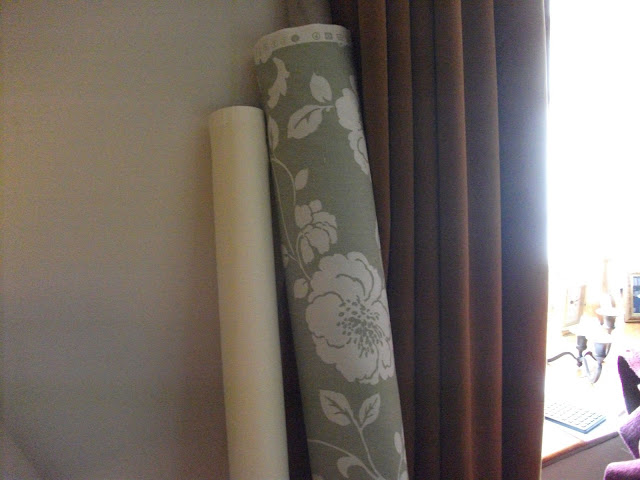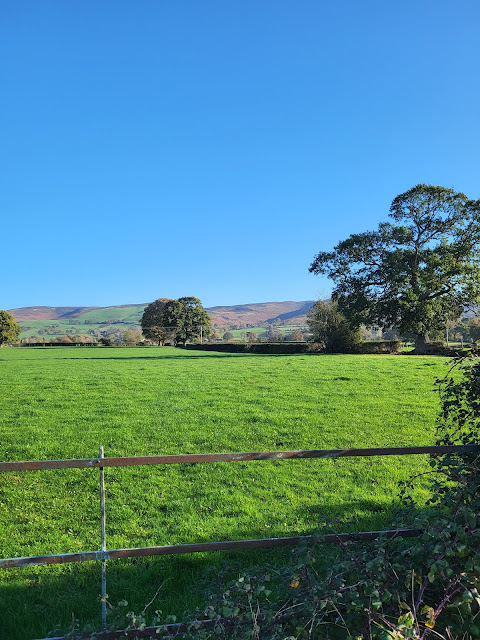Where I live
I look out this morning to the sun on the hills. For years my view of these hills was from the other side, the East. The hills are the Clwydian Range, running from Llangollen in the South up to the sea on the North coast of Wales. Clwyd (pronounced Cloo-id) means gate in Welsh and the range is the natural gateway between England and Wales, although for many centuries Wales has included Flintshire, to the East of the range as well. The hills are topped by a number of Bronze and Iron Age hillforts so my sense of them as a geographical barrier between England and Wales is perhaps an ancient one. Certainly these days and for a very long time back into history those who live to the East of them would consider themselves just as Welsh as those who live to the West. Nowadays we live just to the West. I see the hills from our sitting room and bedroom, from my study and from the garden. I love these hills. When we turn to begin to come up the lane towards our village the hills fill the view and my heart lifts. When we drive along the Vale towards our local market town and the long line of the range rises and falls to our left, rearing up above the rich farmland of the Vale, running away to the end of sight, their shapes and curves delight me. I like the fact that I can name each one.
This is Penycloddiau (Pen-er-clo-ddee-eye) seen from our garden. It is crowned with an Iron Age hillfort which is the largest in Wales and one of the largest in Britain. Archaeological digs on the site have also unearthed many Bronze Age artefacts, indicating human habitation going back some four thousand years. We used to live high on the other side of Penycloddiau. The name means hill of the trenches or dykes, referring to the earthworks which make up the hill fort. It would be easy to walk up there, high above the Vale with long views to the Denbigh moors and the mountains of Snowdonia (Eryri in Welsh) without any sense of this ancient history.
Only from the air can you see the outline of the fort and marvel at the scale of the place. This is a photo from the Clwyd-Powys Archaeological Trust. How long people have lived here. If I think about it for long enough a slight dizziness comes.
I have been thinking this week about the impact of where we live. In so many ways we live very lightly on the ground now. Most of us no longer work the earth. Television, film, music, video, all give us a shared culture which has blurred much of our regional distinctiveness into mush. Much of the news here in the UK is from the United States or other parts of the world. The internet connects us in a vast global spider's web mostly to those who think as we do. We spend our days looking at images of celebrities, places, and of more and more things to buy. There is much that is good about this connection. It challenges a narrow minded parochialism. It promotes friendship with people you would never have met face to face. It allows those who do not fit the common mold to find their tribe. But it is not all good. It can promote a superficiality, a rootlessness, an obsession with shiny surface. Connecting strongly to the place where you live fights that and, despite the life online, where you live is still one of the most fundamental things about your life.
I have lived in many places during my lifetime. I spent my childhood in a village on the edge of the Pennines near a Lancashire milltown. As a teenager I lived in Christchurch in New Zealand. It was a sunny, beautiful, adventurous and open air life, a stunning change. Perhaps it was this first extraordinary contrast which made me realise how your life could be shaped by where you live, just as much as by the family you live in, your own personality, your education. The experiences you have come out of the place you live in, whether it is the shops, restaurants, theatres and galleries of the city or the fields, hills and woods of the countryside. Days are where we live, as Philip Larkin said. Bodies too are where we live. And places are where we live, dictating the shape of those days.
After we came back from New Zealand I lived for a number of years in various parts of London and then for twenty years in Manchester. I loved both cities but I always longed at some point to live more rurally. It is nearly twenty years now since we came to live in Wales. I feel rooted here in a way I never have previously as an adult. Villages and small towns give you a community. After a working life of travel, hopping on and off planes and trains, I like staying still.
So what does this place give me?
Physical beauty.
An insight into Welsh language and culture. In a world where globalisation is smoothing out difference, I love to live somewhere with a strong sense of its own identity. I know I could find that in parts of rural England and in Scotland and Ireland too and doubtless in many parts of Europe. Here the persistence of an ancient language offers a way into a way of life and a way of thinking which is strongly distinctive. I have tried to learn Welsh and I can speak it and understand it enough to see through a glass darkly. The best way I can show you what I mean is through music. Here is Welsh singer Rhys Meirion singing an old Welsh carol. I can sing this now myself. It only sounds good in a choir bacause I have a very ordinary voice but I would never have learnt Welsh and started singing if we had not come here all those years ago. A whole valuable part of my life would never have happened.
Community. My choir, my book club, my Pilates class, my Welsh chat group. There are communities in cities I know and I am sure that if I had to move I could find another one but communities take time to build and I am seventy now. Unless it were to live very near to one of my children I cannot think of any reason to give up all this. This is where I live and therefore how I live. I love it.









That is not a hillfort I have heard of - it wasn't covered in our degree course either. It certainly appears to be defensive from Liverpool Uni's digs there. Like you I love the sense of community in Wales, and the scenery is breathtaking. I prefer Brecknock to Carmarthen if I am honest. Wild hills are more my sort of scenery. My understanding of Welsh is limited to be able to interpret (and usually pronounce) Welsh place names on maps, but my children are all bilingual and Tam uses it in work all the time.
ReplyDeleteLovely photos and blog. Made me reminisce about staying on the Old Racecourse, Oswestry on my first trip "home" in the late 1960's. We looked across towards the Welsh border and, looking at the map, I presume it would have been towards Rhydycroesau. My father and I used to take the bus down to Oswestry to shop and I loved listening to the passengers speaking Welsh. I had thought it would be nice to revisit it but having seen some photos recently it is overgrown now and I think better to remember it as it was.
ReplyDeleteWendell Berry said, "If you don't know where you are, you don't know who you are." A sense of place roots one. Your words, "This is where I live and therefore how I live" are so true. Culture and landscape bring much to bear on our lives. Beautiful images and words.
ReplyDelete